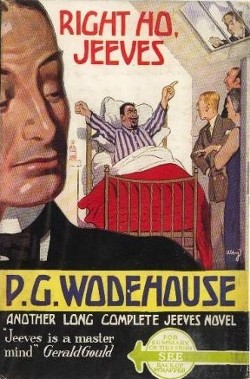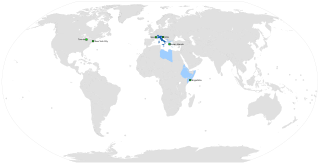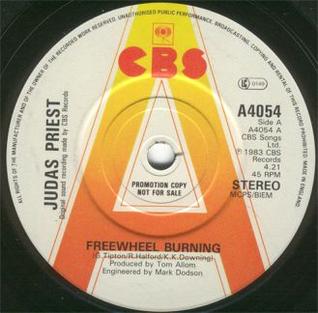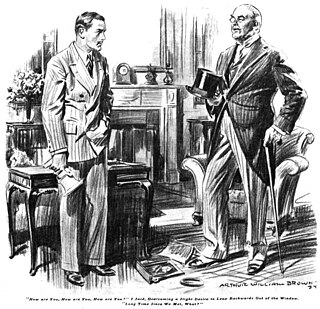Related Research Articles
A tongue twister is a phrase that is designed to be difficult to articulate properly, and can be used as a type of spoken word game. Additionally, they can be used as exercises to improve pronunciation and fluency. Some tongue twisters produce results that are humorous when they are mispronounced, while others simply rely on the confusion and mistakes of the speaker for their amusement value.

Bertram Wilberforce Wooster is a fictional character in the comedic Jeeves stories created by British author P. G. Wodehouse. An amiable English gentleman and one of the "idle rich", Bertie appears alongside his valet, Jeeves, whose intelligence manages to save Bertie or one of his friends from numerous awkward situations. Bertie Wooster and Jeeves have been described as "one of the great comic double-acts of all time".

Augustus "Gussie" Fink-Nottle is a recurring fictional character in the Jeeves novels of comic writer P. G. Wodehouse, being a lifelong friend of Jeeves's master Bertie Wooster and a country member of the Drones Club. He wears horn-rimmed spectacles and studies newts.

Tom Thumb is a character of English folklore. The History of Tom Thumb was published in 1621 and was the first fairy tale printed in English. Tom is no bigger than his father's thumb, and his adventures include being swallowed by a cow, tangling with giants, and becoming a favourite of King Arthur. The earliest allusions to Tom occur in various 16th-century works such as Reginald Scot's Discovery of Witchcraft (1584), where Tom is cited as one of the supernatural folk employed by servant maids to frighten children. Tattershall in Lincolnshire, England, reputedly has the home and grave of Tom Thumb.

Right Ho, Jeeves is a novel by P. G. Wodehouse, the second full-length novel featuring the popular characters Jeeves and Bertie Wooster, after Thank You, Jeeves. It was first published in the United Kingdom on 5 October 1934 by Herbert Jenkins, London, and in the United States on 15 October 1934 by Little, Brown and Company, Boston, under the title Brinkley Manor. It had also been sold to the Saturday Evening Post, in which it appeared in serial form from 23 December 1933 to 27 January 1934, and in England in the Grand Magazine from April to September 1934. Wodehouse had already started planning this sequel while working on Thank You, Jeeves.

The Accademia della Crusca, generally abbreviated as La Crusca, is a Florence-based society of scholars of Italian linguistics and philology. It is one of the most important research institutions of the Italian language, as well as the oldest linguistic academy in the world.
"Minnie the Moocher" is a jazz song co-written by American musician Cab Calloway and first recorded in 1931 by Calloway and his big band orchestra, selling over a million copies. "Minnie the Moocher" is famous for its nonsensical ad libbed lyrics, also known as scat singing. In performances, Calloway would have the audience and the band members participate by repeating each scat phrase in a form of a call and response, eventually making it too fast and complicated for the audience to replicate.

The Beatnuts is an American hip hop group and production duo from New York City. Its current members are JuJu and Psycho Les. JuJu is a Dominican American from Corona and Psycho Les is a Colombian American from Jackson Heights, Queens. Although only peripheral members, they are routinely acknowledged by Q-Tip as being members of Native Tongues. The Beatnuts were originally a trio before Fashion, now known as Al' Tariq, left the group to start a solo career. V.I.C. was also a member of The Beatnuts' production team for a while.

Theophilus Cibber was an English actor, playwright, author, and son of the actor-manager Colley Cibber.

Much Obliged, Jeeves is a comic novel by P. G. Wodehouse, published in the United Kingdom by Barrie & Jenkins, London, and in the United States by Simon & Schuster, Inc., New York under the name Jeeves and the Tie That Binds. Both editions were published on the same day, 15 October 1971, which was Wodehouse's 90th birthday.

"Freewheel Burning" is a song by the English heavy metal band Judas Priest, appearing on their 1984 album Defenders of the Faith, and released as the first single off that album. The 12" version of the single contained an extended guitar intro that was omitted on the full-length release.

Fly tying is the process of producing an artificial fly used by fly fishing anglers to catch fish. Fly tying is a manual process done by a single individual using hand tools and a variety of natural and manmade materials that are attached to a hook. Although the recent history of fly tying dates from the middle 1800s, fly tyers were engaged in tying flys since at least 200 AD.

"Shakermaker" is a song by the English rock band Oasis. It was written by lead guitarist Noel Gallagher. The song was first released as a second single on 20 June 1994 and later released on Oasis' debut album Definitely Maybe (1994). The single peaked at number eleven in the UK. It was certified silver by the British Phonographic Industry in 2013, having previously been their only single of the 1990s not to be certified in the UK. As of 2021, it remains the only single from the band's first two albums not to reach at least platinum status in the UK.

Aunts Aren't Gentlemen is a comic novel by P. G. Wodehouse, first published in the United Kingdom in October 1974 by Barrie & Jenkins, London, and in the United States under the title The Cat-nappers on 14 April 1975 by Simon & Schuster, New York. It was the last novel to feature some of Wodehouse's best known characters, Bertie Wooster and his resourceful valet Jeeves, and the last novel fully completed by Wodehouse before his death.

Thank You, Jeeves is a Jeeves comic novel by P. G. Wodehouse, first published in the United Kingdom on 16 March 1934 by Herbert Jenkins, London, and in the United States on 23 April 1934 by Little, Brown and Company, New York.

The Mating Season is a novel by P. G. Wodehouse, first published in the United Kingdom on 9 September 1949 by Herbert Jenkins, London, and in the United States on November 29, 1949, by Didier & Co., New York.

The Pattern 1908 cavalry trooper's sword was the last service sword issued to the cavalry of the British Army. It has been called the most effective cavalry sword ever designed, although its introduction occurred as swords finally became obsolete as military weapons. In use, it, like other thrust-based cavalry swords, is best described as a one-handed lance, due to its complete lack of utility for anything but the charge. In fact, the closely related US Model 1913 Cavalry Saber was issued with only a saddle scabbard, as it was not considered to be of much use to a dismounted cavalryman. Colonial troops, who could expect to engage in melee combat with opposing cavalry frequently carried cut and thrust swords either instead of, or in addition to, the P1908/1912.

Reginald "Reggie" Pepper is a fictional character who appears in seven short stories by English author P. G. Wodehouse. Reggie is a young man-about-town who gets drawn into trouble trying to help his pals. He is considered to be an early prototype for Bertie Wooster, who, along with his valet Jeeves, is one of Wodehouse's most famous creations.

"How much wood would a woodchuck chuck" is an American English-language tongue-twister. The woodchuck, a word originating from Algonquian "wejack", is a kind of marmot, regionally called a groundhog. The complete beginning of the tongue-twister usually goes: "How much wood would a woodchuck chuck if a woodchuck could chuck wood The tongue-twister relies primarily on alliteration to achieve its effects, with five "w" sounds interspersed among five "ch" sounds, as well as 6 "ood" sounds.

"The Rummy Affair of Old Biffy" is a short story by P. G. Wodehouse, and features the young gentleman Bertie Wooster and his valet Jeeves. The story was published in the Saturday Evening Post in the United States in September 1924, and in The Strand Magazine in the United Kingdom in October 1924. The story was also included in the 1925 collection Carry On, Jeeves.
References
- ↑ "Twisters". sakara.com. Archived from the original on 20 February 2009. Retrieved 22 November 2007.